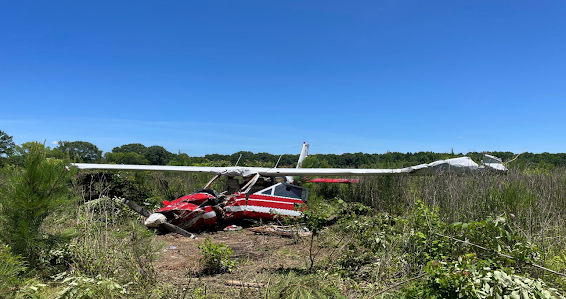https://data.ntsb.gov/carol-repgen/api/Aviation/ReportMain/GenerateNewestReport/194288/pdf
https://data.ntsb.gov/Docket?ProjectID=194288
https://registry.faa.gov/AircraftInquiry/Search/NNumberResult?NNumberTxt=3268T
- Location: Selma, Alabama
- Accident Number: ERA24LA222
- Date & Time: May 18, 2024, 21:15 Local
- Registration: N3268T
- Aircraft: Cessna 177
- Aircraft Damage: Substantial
- Defining Event: Loss of engine power (total)
- Injuries: 1 Serious
- Flight Conducted Under: Part 91: General aviation - Personal
On May 18, 2024, at 2115 eastern daylight time, a Cessna 177, N3268T, was substantially damaged when it was involved in an accident near Selma, Alabama. The commercial pilot was seriously injured. The personal flight was operated under the provisions of Title 14 Code of Federal Regulations Part 91.
The pilot reported that a preflight inspection revealed no anomalies, and he subsequently departed on a night cross-country flight. While in cruise flight at an altitude of 3,500 ft, he noticed a sudden drop in oil pressure, declared an emergency with air traffic control, and diverted to a nearby airport. While enroute to the diversion airport, the engine began running roughly and oil leaked into the cabin. When the pilot was unable to activate the runway lights at the diversion airport he aborted the landing approach and chose to divert to another airport; however, enroute to the second airport, the engine lost total power, and the airplane impacted terrain about 2.5 miles from the runway.
Postaccident examination of the engine revealed that the No. 4 piston was seized in its cylinder and its connecting rod had separated from the crankshaft. In addition to the crankshaft’s No. 4 throw bearing, main bearings Nos. 2 and 3 also exhibited features consistent with oil starvation. The engine’s oil pump was undamaged and displayed no abnormal operating signatures. An unquantified amount of oil was found on the underside of the airplane’s fuselage, within the engine cowling, and remaining with the engine’s impactdamaged oil sump. Based on the pilot’s initial description that the engine had lost oil pressure during the flight, and the damage signatures observed that were consistent with oil starvation, it is likely that the loss of engine power was due to insufficient lubrication to the engine’s internal components. The reason for the oil starvation could not be determined.
- Probable Cause: Insufficient lubrication of the engine’s internal components, which resulted in a total loss of engine power.


No comments:
Post a Comment